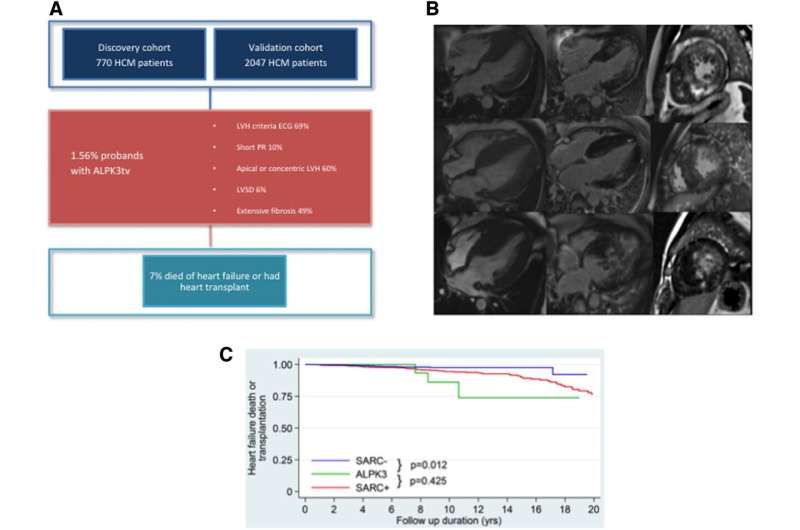
A UCL-led research team has identified a new gene as a cause of hypertrophic cardiomyopathy, an inherited heart condition affecting one in 500 people.
The discovery, published in the European Heart Journal, provides a new causal explanation for 1–2% of adults with the condition. (In the UK, this is approx. 1,250–2,500 people.)
As a result of the study, the new causal variants, known as truncating ALPK3 (alpha-protein kinase) variants, should be added to genetic testing/screening, allowing doctors to identify a greater number of people who are at risk of developing the condition and who would therefore benefit from regular monitoring.
In hypertrophic cardiomyopathy, heart muscles are thicker, which can make it harder for the heart to receive and pump blood. While in most cases the condition will not affect daily life, it can cause heart failure and is frequently cited as the most common cause of sudden unexpected death in young people.
About half of cases already have known genetic causes, linked to eight to 10 specific genes (only two of these single genes were found in the last decade).
Lead author Dr. Luis Lopes (UCL Institute of Cardiovascular Science), also a Consultant Cardiologist at Barts Health NHS Trust, said: “Hypertrophic cardiomyopathy is an extremely common genetic condition. Earlier, small-scale studies suggested that variants in the ALPK3 gene could be a cause of a rare pediatric form of cardiomyopathy, but only when two abnormal copies were inherited. We have now proved that just one abnormal copy is enough to cause hypertrophic cardiomyopathy in adults, looking at a large number of patients and families. This form of inheritance (autosomal dominant) is much more prevalent, as inheriting just one abnormal copy of a gene is more likely than inheriting two.
“Identifying a new genetic cause is important as it opens up new possibilities for potential treatment. It also helps families who have been affected by the condition, but who did not know why, to know that a cause has been found for their specific case.”
In the new study, an international team of researchers analyzed the genomes of 2,817 people with hypertrophic cardiomyopathy referred from centers in Spain, the UK, Denmark, Russia, Latvia, Brazil, and Argentina. They compared the prevalence of the ALPK3 variants with that of the general population, finding it was 16 times more common.
Researchers also studied the presence of the variant within families, testing whether or not it was causal by looking at whether the variant tracked with disease—that is, whether family members who had the variant also had the disease.
The research team looked at the distinct nature of the disease compared to when it was caused by faults in the sarcomere genes—the primary way the disease is inherited. (They are named the sarcomere genes as their function relates to sarcomeres, the basic contractile unit, or primary building block, of muscle fiber.)
They found that, in cases where the new gene is implicated, the disease was diagnosed later (at an average age of 56) but had similar rates of heart failure and heart transplantation as in cases linked to sarcomere genes.
While little is known about the functional consequences of ALPK3 variants, they are believed to play a role in the regulation of protein function through a process of phosphorylation. Proteins are fundamental to the process of heart muscle cells contracting and relaxing.
Dr. Lopes said: “ALPK3 variants represent a different pathway to the disease than the other main known causes in the sarcomere genes. This discovery is exciting as it will establish new targets for therapies. We now need to explore mechanisms that explain how the ALPK3 variants are linked to the condition.”
Source: Read Full Article